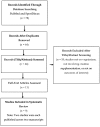Benefits of Creatine Supplementation for Vegetarians Compared to Omnivorous Athletes: A Systematic Review
- PMID: 32349356
- PMCID: PMC7246861
- DOI: 10.3390/ijerph17093041
Benefits of Creatine Supplementation for Vegetarians Compared to Omnivorous Athletes: A Systematic Review
Abstract
Background: Creatine monohydrate is a nutritional supplement often consumed by athletes in anaerobic sports. Creatine is naturally found in most meat products; therefore, vegetarians have reduced creatine stores and may benefit from supplementation.
Objective: to determine the effects of creatine supplementation on vegetarians.
Data sources: PubMed and SPORTDiscus. Eligibility criteria: Randomized controlled trials (parallel group, cross-over studies) or prospective studies.
Participants: Vegetarians.
Intervention: Creatine supplementation. Study appraisal and synthesis: A total of 64 records were identified, and eleven full-text articles (covering nine studies) were included in this systematic review.
Results: Creatine supplementation in vegetarians increased total creatine, creatine, and phosphocreatine concentrations in vastus lateralis and gastrocnemius muscle, plasma, and red blood cells, often to levels greater than omnivores. Creatine supplementation had no effect on brain levels of phosphocreatine. Creatine supplementation increased lean tissue mass, type II fiber area, insulin-like growth factor-1, muscular strength, muscular endurance, Wingate mean power output, and brain function (memory and intelligence) in vegetarian participants. Studies were mixed on whether creatine supplementation improved exercise performance in vegetarians to a greater extent compared to omnivores.
Limitations: Studies that were reviewed had moderate-high risk of bias.
Conclusions: Overall, it appears vegetarian athletes are likely to benefit from creatine supplementation.
Keywords: health; recovery; sport performance; vegan.
Conflict of interest statement
The authors declare no conflict of interest.
Figures
References
-
- Barnard N.D., Cohen J., Jenkins D.J., Turner-McGrievy G., Gloede L., Jaster B., Seidl K., Green A.A., Talpers S. A low-fat vegan diet improves glycemic control and cardiovascular risk factors in a randomized clinical trial in individuals with type 2 diabetes. Diabetes Care. 2006;29:1777–1783. doi: 10.2337/dc06-0606. - DOI - PubMed
-
- Schmitz H., Chevaux K. Nutrition and Immunology. Humana Press; New York, NY, USA: 2000. Defining the role of dietary phytochemicals in modulating human immune function; pp. 107–119.
Publication types
MeSH terms
Substances
LinkOut - more resources
Full Text Sources
Medical


